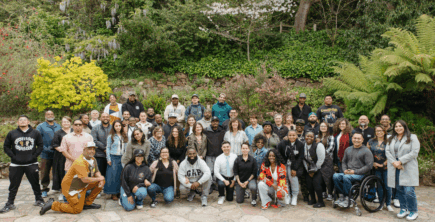
LGBT

Fires in Southern California, January 2025.
Donations after a crisis can be a lifeline — but there’s an opportunity for them to be much more. By empowering and uplifting grassroots leaders, grantmakers can transform disaster response from a series of isolated actions into a cohesive, effective strategy that rebuilds communities.
Effective crisis response grantmaking happens when funders center and trust grantees representing the communities they serve, resource frontline leaders and community-led approaches at scale, and build authentic relationships with grantees that deepen engagement. Here are five best practices we hope you’ll consider to ensure your crisis response grantmaking is rooted in respect, flexibility, and collaboration, ultimately enhancing the effectiveness of your giving and fostering stronger, more resilient communities.
If you’re interested in crisis response, consider supporting Tides Foundation’s Crisis Response Fund, which is designed to help communities historically denied power rebuild after a hurricane, wildfire, or other crisis.
Fund and trust local organizations that are already embedded in the communities you seek to serve. Community-based organizations and proximate leaders are often the first on the scene when a crisis occurs. They have the expertise to know what assistance is needed, and they are well-versed in the complex political, social and cultural context of the crisis within their community. Their local knowledge and established relationships enable them to respond effectively. Provide unrestricted grants, when possible, that allow these organizations to allocate resources where they are most needed without excessive oversight or restrictive conditions.
Systemic inequities often underpin repeated crises. Crises can exacerbate the inequities faced by communities of color and other marginalized groups, harming their ability to fully recover from life-changing — and often life-threatening — events. By addressing these underlying factors, we can help communities build resilience and reduce their vulnerability to future crises. Prioritize organizations led by members of the communities they serve.
During times of crisis, the organizations that are responding need as much flexibility as possible to meet the evolving needs of their communities. General operating support allows grantees to do what they do best, nimbly directing resources to their community’s most pressing needs, which may evolve as circumstances change. Instead of directing how the money is spent, allow grantees to use funds as they see fit.
Every minute counts after a crisis occurs to prevent additional suffering and compounding harm. For domestic crisis response grantmaking, consider eliminating application processes and formal reporting to streamline aid and ensure swift, effective support. In place of formal applications and reporting requirements, lean on trusted referrals to direct your funds. Once the crisis has passed, continue to build and foster trust-based relationships with grantees and engage in ongoing dialogue with them to understand their needs and challenges. This approach respects their time and resources, allowing them to focus their capacity on their crisis response. If you must go through an application process, use short, streamlined, flexible applications and offer rapid funding decisions, avoiding burdensome requirements that could delay critical support.
International grantmaking is more complex and restrictive due to IRS rules, but it’s still possible to minimize the burden on international grantees and provide maximum flexibility as they navigate their crisis response. Reach out to your Tides advisor to learn more about how we do this through expenditure responsibility and/or equivalency determination.
Work together with other funders, organizations, and community leaders to coordinate your efforts and provide resources equitably. Consider participating in or facilitating collaborative funding initiatives and sharing insights with other stakeholders to align strategies and maximize your impact. This level of coordination of resources can be extremely valuable and can reduce administrative burden on the responding organizations so they can focus on their response.
Learn more about Tides’ Crisis Response Fund.

LGBT

Corporate Partners

Philanthropy

Read the stories and hear the voices of social change leaders fighting for justice.